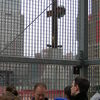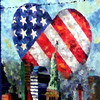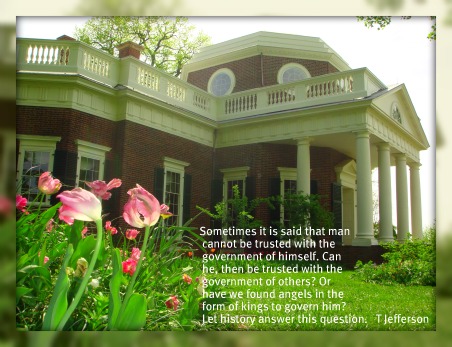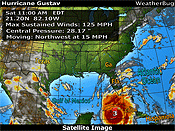One Place Three Faiths
 Monday, May 28, 2007 at 09:18AM
Monday, May 28, 2007 at 09:18AM
The Holy Land Experience
By;
Dan'el Fraley
Judaism. Christianity. Islam. The world's three great monotheistic religions have a long, intertwined history. They embrace a belief in a single Supreme Being: HaSheam, God, Allah. They all claim Abraham as their ancient patriarch. Their stories are common and filled with the Biblical events of the Middle East. These religions have had many periods of violent strife and it continues to this day. All three faiths are expecting the Messiah to come soon. I know, by reading God's word, that He will be the only one to bring peace and hope to the problems in Middle East and the rest of the world. I can not help but to think that the Lord, when He comes back, will reprimand all three faiths for not "hitting the mark" in what was expected of us.
Christianity has mixed with pagan traditions (such as easter/ishtar and Nimrod trees/Christmas), changed His Holy days (appointed times of meeting), and claim that Jesus abolished the laws (God changed His mind).
Judaism has not been an example to the world of proper worship of HaSheam. They have Placed the Lord in a box for themselves and not wanted to share Him with the world. They have built man made fences around their religion with laws added unto laws.
Islam has failed to see that the Crater of all things, does just that, He creates. He has not called Islam to be His arm of destruction of His creation. God is a God of mercy and grace for all mankind and His judgements are His not Islam's. The precious life granted to each of us to enjoy His creation has been cheapened by the death and destruction. Peaceful Islam, if there is such a thing, needs to put a restraint on the radical side of their belief before they destroy the world. When the Messiah does come, I fear that He will deal severely with them. Messiah eminent coming should wake us all up to ready ourselves for that day. To search our souls, seek truth, love all His children and let Him judge us when He comes.
WEST BANK
"All human beings are like the organs of a body:
when one is afflicted with pain'
the others can not rest in peace."
_Sadi Shirazi, Iranian poet
My brother Andrew, and I were blessed to be able to visit Israel and the West Bank for 55 days in the fall of 2004. We experienced two major religious events while I was there. The Festival of Rosh HaShanna, for the Jewish faith and the Moslem month of Ramadon. Our mission was two fold, one to tour the land, and second to speak with the inhabitants. We knew we would be welcomed by the Jews, but we were not sure how the Arabs would receive us. We were pleasantly surprised at how the Moslem people opened up to our questions. While we were talking to two Arab men in the West Bank, my nephew A.J. (9 years old) started playing soccer with some of the Arab Chiltern playing in the street. In the middle of our conversation, to our great surprise, one of the Arab men turned to me, pointed to the Children playing, and made the most profound statement. He said, "We all need to be innocent just as those children and then maybe we could be OK." We were not expecting this to come out of a Palestinian mouth, especially after his brother showed us where he had been shot by an Israeli soldier for throwing a rock when he was a child.
We did not feel comfortable everywhere we went in the West Bank, one day we thought we would take the road on the map going straight to Nazareth, from Jerusalem. It looked like a good road on the map, and it was, for about 6 or 7 miles. We came to an Israeli check point and were waved on through. Well sure, the Israeli's did not mind what went into the West Bank, it was when you come out they took a closer look. Our good road turned to a "donkey trail" immediately going into Ramallah. We had no idea that it was the day that the Palestinian leader Yasser Araphat was being moved from Ramallah to France for medical treatment. There are no by-passes to take you around the town, and it would have been impossible to do a u-turn. To do so, we would have caused a scene and be recognized for infidels. In the bumper to bumper traffic, in a brand new rent- a -car, with Israeli tags, knowing that we were not supposed to drive into the West Bank, we began to pray. Here we are in the middle of down town Ramallah, the headquarters of the Palestinian terrorist organization "FATA" with thousands and thousands of Palestinians surrounding our car, and we are trying to look inconspicuous. Isn't it wonderful that God also protects His stupid Christians? Either the crowds were too busy celebrating whatever, or God truly distracted their attention away from us. I do not know how long it actually took us to get through town, but it felt like several hours. We finally made it through town and were on our way north to Nazareth when we come to another Israeli check point. I rolled down my window and immediately became bombarded with words I have not heard since I was in the Marine Corps. This Jewish boy/soldier from Brooklyn NY, recognized us instantaneously as stupid tourists and was letting me have it. "What in the #*&#@ - are you doing coming out of Ramallah today of all days? We told him we were headed to Nazareth, and he told us " we were headed for the #&*%# grave yard." He sent us west to Jaffa/Tel Aviv to go up the coastal road to Nazareth.
Israel
"Nothing has proved harder in civilization
than seeing God or good or dignity in those unlike ourselves.
There are surely many ways of arriving at that generosity of spirit,
and each faith may need to find its own way.
I propose that the truth at the heart of monotheism is that God is greater than religion,
that God is only partially comprehended by one faith....
What would such a (broader) faith be like?
It would be like being secure in my own home and yet moved by the beauty of a foreign place
knowing that it is not my home, it is still part of the glory of the world that is ours.
It would be knowing that we are sentences in the story of our people
but that there are other stories, each written by God out of the letters of lives
bound together in community.
Those who are confident of their faith are not threatened but
enlarged by the different faiths of others.
In the midst of our multiple insecurities, we need now the
confidence to recognize the irreducible, glorious dignity of difference."
Jonathan Sacks, Chief Rabbi
of the British Commonwealth
In Israel there a lot of contrast, in the landscape, in the people, in the cities, in religion and in the commerce.
The Landscape
Even though the whole state of Israel is about the size of Delaware, a ten minutes drive in any direction brings a complete change in scenery. This little country has everything the United States has but its packed closer together. Israel has fresh and salt water lakes, an ocean, mountains, deserts, forests, rivers and a melding pot of people.
The People
Jews from every nation and language have settled in Israel, they revived a dead language of Hebrew and have caused that little nation to bloom. They try to live in harmony with those around them, but they are very protective of their own. Historically they have not had a land of their own in thousands of years and God help any nation who tries to take it away from them.
The Cities
The main contrast between cities in Israel I encountered, is between Tel Aviv and Jerusalem. Tel Aviv is a modern city with its daytime commerce and at night it goes into its party mode. The nations of the world choose to put their embassies in Tel Aviv rather than Jerusalem to appease the Arabs. (We do not recognise Jerusalem as the capital of Israel, even though we were given land in Jerusalem to build our embassy.) Jerusalem in contrast is a Holy city with the leaders of different religions strutting around in their fancy garments. There is a saying in Israel that goes like this: "You go to Tel Aviv to play and to Jerusalem to pray".
Each city in Israel has a different personality, and I could ramble on for hours telling a little something about the ones we visited.
Commerce
Having rented an apartment in Jerusalem, it was time to stock it with groceries. Our first trip to the grocery store was an experience. Very few items had English translations on them, and we chose items we thought were one thing and it turned out to be another. As an example, we all like milk, so we buy what we thought was a gallon of milk. When we sat down for breakfast the next morning to have us a bowl of cereal and tried to pour the milk, it was solid. We thought we had bought a gallon of sour milk and when we went to return it, we learned that milk comes in a plastic bag, the jug we had was yogurt. They explained to us in the best way they could that yogurt was used more than milk and cereal was good with yogurt and sugar. They also told us to take jelly or jam and mix with the yogurt, freeze it and it is flavored ice cream. We tried it and sure enough yogurt and cereal is good, and so is semi home made ice cream. We learned right away to find someone who spoke English before we bought something we were not sure of.
There was quite a contrast between the way Jews and Arabs conducted business. In the early morning before the Arab markets opened for business, you would smell hash and opium smoke. Groups of men gathering with their Turkish coffee in front of their stores ready to catch the first "fish" that they make eye contact with. Never be polite or say "good morning", or you would be hooked. I saw a whole new meaning to the fraise "fishers of men". If one does not pass by their store quickly and with head turned down, they would be bombarded with sales pitches like lures to a fish. They knew just how to play your ethnicity. To Americans, it was their sympathy, and to the English, it was their pride. They reminded me of Mexican border town merchants.
In several of the Jewish businesses we visited the atmosphere was quite different. After the usual pleasantries and being ask if they could help you, they would go back to reading their TaNaKah (Bible/Old testament). If you linger awhile, they would start to engage you in a religious discussion., or they would ask if you have ever read Psalm such and such. They placed God and study of His word foremost in their lives. This does not mean that all the Jewish shopkeepers were this way, because some we visited were as cold as an IRS agent.










